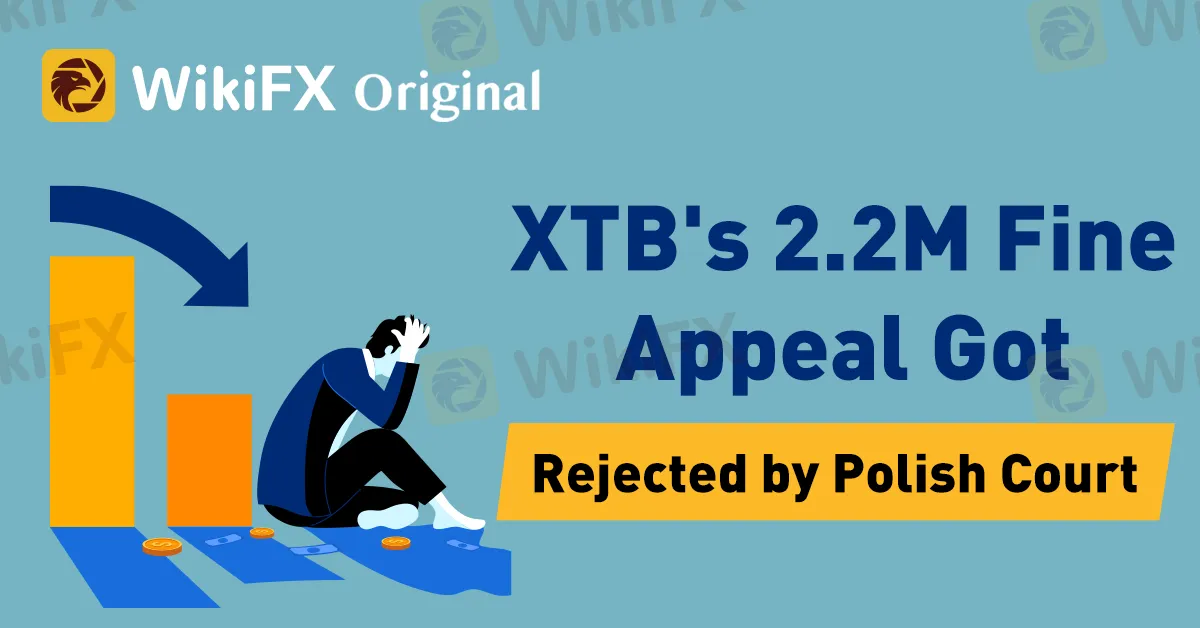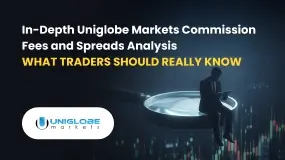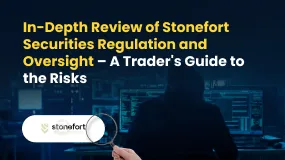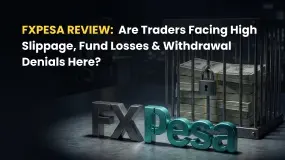简体中文
繁體中文
English
Pусский
日本語
ภาษาไทย
Tiếng Việt
Bahasa Indonesia
Español
हिन्दी
Filippiiniläinen
Français
Deutsch
Português
Türkçe
한국어
العربية
XTB's 2.2M Fine Appeal Got Rejected by Polish Court
Abstract:In 2018, XTB was fined PLN 9.9 million (more than $2.2 million) by the Polish Financial Supervision Authority (KNF) . The broker appealed to the court but was again rejected.

The Polish Financial Supervision Authority (KNF) decided to fine XTB PLN 9.9 million (more than $2.2 million) in 2018. XTB appealed this judgement, but the Polish Supreme Administrative Court (NSA) dismissed it.
It was the second cessation appeal submitted by former X-Trade Brokers, the KNF press release from Wednesday stated. In September 2018, the Polish regulator penalised the broker, and the publicly traded company contested the ruling. However, the Warsaw Voivodship Administrative Court dismissed XTB's argument and maintained the judgement. Now, the NSA has come to the same conclusion.
The offering of brokerage services without considering the client's interests was a violation of the Polish Financial Instruments Trade Act, and the KNF penalised the company for it. In the immediate model, the business executed client orders using an asymmetrical setting of the deviation parameter from 1 January 2014 to 31 May 2015.
As the transaction's counterparty, XTB used asymmetric price slippage to facilitate the complete transmission of execution losses to clients. In contrast, the broker profited from favourable price changes. This indicates that while clients did not receive any price enhancement when XTB executed client orders at a better price than anticipated, XTB did so when the slippage benefits them.

The translation of the KNF's statement is as follows:
Also, XTB used the delay parameter on a particular group of clients under the scrutiny of the Trading Department as a tool for additional price verification of the placed orders, which resulted in the suspension of execution of their orders for the milliseconds defined by this parameter.
It's interesting to note that XTB shares increased strongly in response to the Polish court's ruling. They had a spike of about 5% in just 15 minutes, bringing them once closer to the record highs of PLN 35.30 set on 21 February 2023.
The Polish FX/CFDs broker based on the Warsaw Stock Exchange revealed a significant fall in profits for the fourth quarter of 2022 in its preliminary quarterly financials issued a month ago. Even though the company's sales rose annually, they fell sharply from the prior quarter.
According to official data, XTB's operating income or revenue for the three months ending in December totalled PLN 216.7 million (about $49 million), a dramatic decrease of almost 45% from the PLN 391.3 million it brought in the previous quarter. XTB generated revenues of PLN 439.8 million and PLN 396.4 million in Q1 and Q2, respectively, which suggests that Q4 was the least successful quarter of 2022.

Disclaimer:
The views in this article only represent the author's personal views, and do not constitute investment advice on this platform. This platform does not guarantee the accuracy, completeness and timeliness of the information in the article, and will not be liable for any loss caused by the use of or reliance on the information in the article.
Read more

In-Depth Uniglobe Markets Commission Fees and Spreads Analysis – What Traders Should Really Know
For experienced traders, the cost of execution is a critical factor in broker selection. Low spreads, fair commissions, and transparent pricing can be the difference between a profitable and a losing strategy over the long term. This has led many to scrutinize the offerings of brokers like Uniglobe Markets, which presents a tiered account structure promising competitive conditions. However, a professional evaluation demands more than a surface-level look at marketing claims. It requires a deep, data-driven analysis of the real trading costs, set against the backdrop of the broker's operational integrity and safety. This comprehensive Uniglobe Markets commission fees and spreads analysis will deconstruct the broker's pricing model, examining its account types, typical spreads, commission policies, and potential ancillary costs. Using data primarily sourced from the global broker inquiry platform WikiFX, we will provide a clear-eyed view of the Uniglobe Markets spreads commissions prici

In-Depth Review of Stonefort Securities Regulation and Oversight – A Trader's Guide to the Risks
For experienced traders, the process of selecting a new broker transcends a simple comparison of spreads and leverage. It is a meticulous due diligence exercise where the integrity of the broker's regulatory framework is paramount. Stonefort Securities, a relatively new entrant in the crowded brokerage space, presents a complex and often contradictory profile. On one hand, it boasts a modern MT5 platform and a stream of positive user testimonials. On the other hand, it is shadowed by severe regulatory warnings that question the very foundation of its operations. This in-depth review focuses on the core issue for any long-term trader: Stonefort Securities regulation and oversight. We will dissect the broker's corporate structure, scrutinize its licensing claims, and analyze what the data implies for trader protection and fund security. For traders evaluating whether Stonefort Securities is a trustworthy partner, understanding these details is not just important—it is essential.

FXPesa Review: Are Traders Facing High Slippage, Fund Losses & Withdrawal Denials?
Do FXPesa support officials fail to pick up your calls when you raise fund withdrawal requests with the broker? But are these officials always open to you regarding fund deposits? Do you frequently spot slippage and stop-loss order execution errors on the FXPesa login? These issues are increasingly becoming common with this forex broker. Consequently, many traders have expressed their dissatisfaction with the broker online. In this FXPesa Review article, we have shared some of these complaints. Take a look!

Trive Investigation: High Score, Hidden Risk - The Profit Paradox
A disturbing pattern has emerged regarding the broker Trive. Despite holding a high WikiFX score (7.91) and valid licenses in South Africa and Australia, recent investor reports suggest a significant disconnect between the platform's reputation and its treatment of profitable clients. While the regulatory paperwork appears in order, our data indicates that traders are facing sudden account freezes and accusations of "trading abuse" precisely when they attempt to withdraw profits. This report investigates why a seemingly "safe" broker is generating high-risk complaints.
WikiFX Broker
Latest News
WikiFX's New Evaluation of ATM Capital LTD: Does its License Protect the Arab Investor?
How a Fake Moomoo Ad Led to the “New Dream Voyage 5” Scam
Is Axi Legit? A Data-Driven Analysis of Its Regulatory Standing and Trader Feedback
FXPesa Review: Are Traders Facing High Slippage, Fund Losses & Withdrawal Denials?
Trive Investigation: High Score, Hidden Risk - The Profit Paradox
In-Depth Uniglobe Markets Commission Fees and Spreads Analysis – What Traders Should Really Know
Bessent believes there won't be a recession in 2026 but says some sectors are challenged
Is GGCC Legit? A Data-Driven Analysis for Experienced Traders
Young Singaporean Trader Grew USD 52 into a USD 107,700 Portfolio
In-Depth Review of INZO Trading Conditions and Product Offering – A Data-Driven Analysis
Currency Calculator




